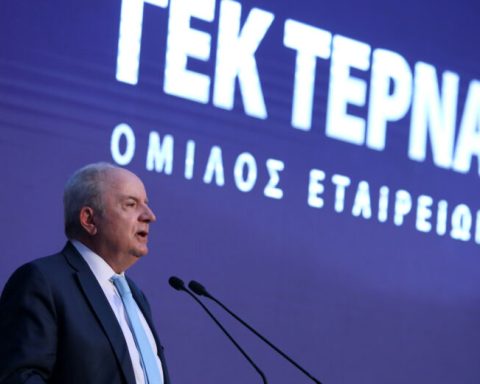 Οριστικοποιήθηκε, όπως μεταδίδουν ανταποκριτές από τις Βρυξέλλες, στη συνάντηση του πρωθυπουργού με τους επικεφαλής των θεσμών, το προσχέδιο σκοπιμότητας, όπως χαρακτηρίζεται από τα διεθνή μέσα, που θα σταλεί στο Eurogroup ως βάση συζήτησης για μια ενδεχόμενη συμφωνία.
Οριστικοποιήθηκε, όπως μεταδίδουν ανταποκριτές από τις Βρυξέλλες, στη συνάντηση του πρωθυπουργού με τους επικεφαλής των θεσμών, το προσχέδιο σκοπιμότητας, όπως χαρακτηρίζεται από τα διεθνή μέσα, που θα σταλεί στο Eurogroup ως βάση συζήτησης για μια ενδεχόμενη συμφωνία.
Μάλιστα, η συνεδρίαση του Eurogroup που ήταν προγραμματισμένη να αρχίσει στις 14.00, μετατέθηκε χρονικά κατά μισή ώρα και θα ξεκινήσει στις 14.30 για να εγκριθεί το κείμενο προηγουμένως από το Euroworking group.
Νεώτερες πληροφορίες αναφέρουν ότι στο Euroworking group αναμένεται να κατατεθούν δύο προτάσεις, μία από την ελληνική πλευρά και μία από την πλευρά των θεσμών ενώ κατά τις ίδιες πληροφορίες, στο κείμενο της κυβέρνησης περιλαμβάνεται η εξαίρεση των νησιών για τον ΦΠΑ.
Σύμφωνα με πηγές τις οποίες επικαλείται το γερμανικό πρακτορείο ειδήσεων, ΜΝΙ, δεν υπάρχει πλέον στο τραπέζι των διαπραγματεύσεων η απειλή ενός τελεσιγράφου για την Ελλάδα, ενώ σημειώνει ακόμα ότι αν σήμερα δεν υπάρξει συμφωνία, είναι πιθανό να συνεδριάσει το Eurogroup εκ νέου το Σάββατο.
Σύμφωνα με κυβερνητικές πηγές, η ελληνική πλευρά παρέμεινε σταθερή στις προτάσεις της που εξειδικεύθηκαν και κατατέθηκαν στους θεσμούς και θα κατατεθούν και στα θεσμικά όργανα της Ευρωπαϊκής Ένωσης.
Όπως αναφέρουν οι ίδιες πηγές, οι προτάσεις αποτελούν μία άκρως ρεαλιστική προσέγγιση για άμεση συμφωνία στο πνεύμα της απόφασης του Eurogroup και υπογραμμίζουν ότι η ελληνική κυβέρνηση έχει επιδείξει υπευθυνότητα και βούληση για λύση.
Τώρα είναι η ώρα που κρίνεται η υπευθυνότητα και η βούληση του καθενός σημειώνουν
Νωρίτερα, περίπου στις 10 το πρωί της Πέμπτης, ξεκίνησε ο νέος γύρος διαβουλεύσεων σε ανώτατο πολιτικό επιπέδο με στόχο να υπάρξει συμφωνία σε τεχνικό επίπεδο πριν από την έναρξη του σημερινού Eurogroup ενώ είχαν προηγηθεί στις 7 οι διαβουλεύσεις μεταξύ των τεχνικών κλιμακίων, οι οποίες σύμφωνα με κοινοτική πήγη ήταν «εποικοδομητικές».
Η πρόταση των θεσμών στα αγγλικά
Η πρόταση που υπέβαλλαν οι θεσμοί στο Eurogroup
Eurozone finance ministers have begun to gather for their fourth meeting in a week, attempting yet again to strike a deal on a package of Greek economic reforms to release a desperately-needed €7.2bn in bailout funds to Athens.
The ministers have been sent what one official termed a “feasibility blueprint” – but the Financial Times has obtained a copy and it looks very much like the version creditors annotated and sent back to Athens on Tuesday. We’ve posted a copy of the document here.
The first place to look is page three of the nine-page document, where the section on pension reforms begins. This has become the major sticking point between the two sides and, while it makes some concessions to the Greek government, it is very much in keeping with creditor demands that early retirement schemes be curtailed and the effective retirement age be raised very quickly.
Under the plan sent to finance ministers, Athens would ensure the retirement age is moved to 67 by 2022, significantly faster that Alexis Tsipras, the Greek prime minister, had sought. Originally, Athens was pushing for 2036, but Mr Tsipras’ compromise plan submitted on Monday moved that to 2025.
There is an important creditor concession in the pension reforms, too, though. Creditors have been trying to get rid of a “solidarity grant” programme that provides a top-up bonus to poorer pensioners, know by the Greek acronym EKAS, by 2017 at the latest. Athens had offered 2020. The new plan splits the difference and goes with December 2019.
The EKAS phase-out will start immediately, however, with the wealthiest 20 per cent of the recipients losing the benefit as soon as legislation is passed.
There are some other elements of the Greek plan that survived as well, including raising contributions pensioners must make towards healthcare form 4 per cent to 6 per cent.
The other major sticking point between the two sides has been an overhaul of Greece’s value-added tax scheme. Here, too, the plan makes some compromises to the Greek plan. Creditors had originally sought a simplified two-tier system with most goods taxed at the top 23 per cent rate. Creditors have now gone along with a Greek idea of a three-tier system, including a “super-reduced” rate of 6 per cent for pharmaceuticals, books and the theatre.
Importantly, the creditors have conceded on keeping electricity in a middle 13 per cent VAT rate, something Athens has long demanded. “Basic food” also goes into the middle rate, but it appears all other kinds of foods – including restaurants and processed foods – goes at the higher 23 per cent rate. Athens has attempted to keep process foods at the reduced middle rate.
Another blow to Athens: the creditors plan would strip out VAT exemptions for Greek islands. This is particularly sensitive for Mr Tsipras’s coalition partner, the Independent Greeks, who have argued it was unfair for some of Greece’s most remote islands to pay the same kind of taxes that mainlanders do.
On other tax matters, creditors keep Athens’ idea of raising corporate taxes from its current 26 per cent rate, but rather than moving it to 29 per cent as Mr Tsipras suggested, it would be 28 per cent under the creditors’ plan. Gone is the Greek idea of a one-time 12 per cent tax on all corporate profits over €500,000. But the plan keeps Mr Tsipras’s plan to raise luxury tax on yachts from 10 per cent to 13 per cent.
















